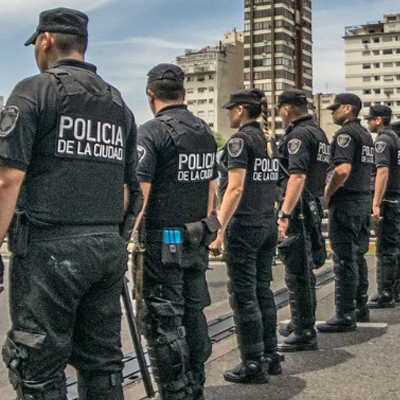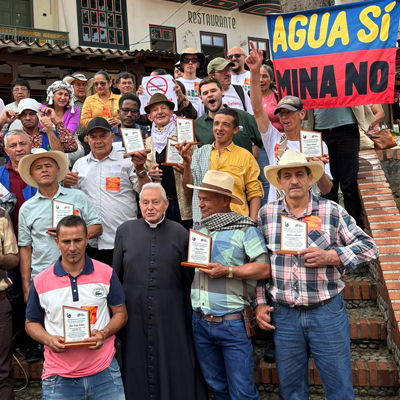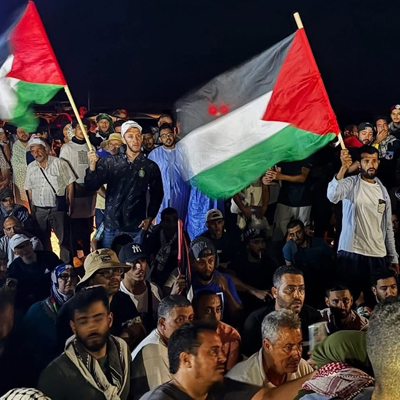New study exposes a rise in peoples’ rights violations during the Covid pandemic in Latin America and the Caribbean
Perspectives from the Global South and North on the onslaught of transnational corporations
 Radio Mundo Real.
Radio Mundo Real.
Friends of the Earth Latin America and the Caribbean (ATALC) launched on Friday a new study entitled “Internationalist Solidarity and the struggle against corporate power. Reflections on the Covid 19 pandemic and corporate violations of peoples’ rights and their human rights.”
The study responded to the need to better explain “the meaning of peoples’ rights and the direct link with environmental justice,” said Danilo Urrea, author of the study and Regional Facilitator of ATALC, in an interview with Real World Radio. “The violation of peoples’ rights is a violation of the rights to food, water, land, territory and to a healthy environment. Those who resist corporate power and represent collective struggles are facing violation of their people’s rights,” he explained.
The study is a product of collaboration between ATALC and NOAH – Friends of the Earth Denmark, and it focuses on El Salvador, Brazil, Costa Rica and Haiti, including work from Friends of the Earth member groups in those countries (CESTA, Amigos da Terra Brasil, COECOCeiba and Haiti Survie).
Urrea, who also acts as focal point for the Internationalist Solidarity System of Friends of the Earth International, added that an important reason behind the study was to expose how the attacks against peoples have worsened during the pandemic. The aim was to highlight “the main features of what we consider a ‘state of emergency’ which brought restrictions against freedoms, our freedom to move, but at the same time continued giving power to transnational corporations, banks, the rich sectors in society, while peoples’ rights, human rights, and particularly women’s rights were being violated.”
Internationalist Solidarity against the encroachment of transnational corporations
Real World Radio delved into the reasons that led NOAH to be part of this research. One of the members of the organisation, Ingvild Haukeland, argued that Latin America is one of the most dangerous places to be an environmental defender and this is “very linked to our consumption here in Denmark or also in Europe in general.”
The activist stated that in order to do proper solidarity work it is necessary to understand how groups work in their countries, what are the main challenges and threats they face, even when thinking about the strategies to follow. “Even though we are fighting against the same structural problems, the extractivist capitalist economy, it is very different the way you talk about it here and the way you are talking about it there. Because here (in Europe) the conversation is often more abstract, we are talking about CO2 emissions, whereas when I talk to colleagues in Central and South America it is very much more about defending territories against destructive projects. So we also wanted to learn more from the movements there,” she said.
Meanwhile, Danilo considered that “it is necessary for solidarity to become an interregional and collective project.” “We know that most of the violations against peoples’ rights and their human rights take place in countries of the Global South and there is a potential for Europe to help raise awareness about these abuses. This is something that also has to do with the Global North, because some of the actors perpetrating these abuses are transnational corporations from that region.”
Ingvild agreed with her Colombian colleague. “The headquarters of the companies are here and the money is coming from here, both from banks and pension funds. That is something that we can definitely do from here,” said the environmental activist. “I also think that an important role for us here is to be that watchdog that actually can criticise whenever these companies are doing greenwashing attempts and claiming that they are on the right way. Our role is to really denounce the lies that they are making and expose the damages they are doing in the global South,” she added.
Violation of rights: actions of transnational corporations and abuses by States
The new study describes the violations experienced by peoples in Latin America and the Caribbean, with particular focus on the period of the Covid-19 pandemic. In the interview with Danilo, several lines of thought are clear: transnational corporations have reinforced the ways in which social movements are criminalised; they also continue to strengthen their criminal practices, safeguarded through an architecture of impunity; and are greatly involved in militarisation and territorial looting.
The Colombian activist provided some examples of this. He said that in terms of the militarisation of territories, “in countries like El Salvador, the pandemic was used as a reason for State security forces to use military forces with political goals, not to tackle the health emergency.”
In all the countries studied there were detentions, judicial proceedings, imprisonment of people who resisted the activities of transnational corporations.
Danilo also warned that “femicides and other forms of violence against women systematically increased” during the pandemic. In Costa Rica there were 120,000 newly unemployed women, totalling 230,000 women without jobs. Women were expelled from the labour market, they had to stay at home, many locked in with domestic abusers, and attacks grew exponentially.
There were also violations of the human right to water. The study highlights, for instance, that in the worst moments of the pandemic, when Salvadoran President Nayib Bukele announced a national lockdown and the World Health Organisation promoted frequently washing your hands as a defence strategy, many communities in the metropolitan area of the country’s captial city, San Salvador, faced extended cuts to their water supply. Some of these communities spent up to 22 days without access to water.
Danilo also said that hunger in Brazil reached record levels. According to a study mentioned in the document, by the Brazilian Research Network on Sovereignty and Security (Red PenSANN), out of the 211.7 million people living in Brazil, 116.8 million experienced some degree of food insecurity (low, moderate or serious.) Hunger affected 19 million people in the worst moment of the pandemic in that country.
Meanwhile, Ingvild considered that it was important to have the time and the capacity to do an analysis of the links between the restriction of democratic rights during the pandemic and the increase of corporate impunity, more criminalisation and in general a very difficult environment to work as a social movement or as civil society. It was possible to have “a deeper understanding about the forces behind the problems that we see, so that we could actually figure out responses that tackle the root causes,” expressed Ingvild.
From resistance to offensive
In light of this finding about the general rise of the power of transnational corporations in Latin America and the Caribbean, particularly in El Salvador, Brazil, Costa Rica and Haiti, the new study includes some of the responses of the peoples and social movements.
Danilo told Real World Radio that the “political moment we are experiencing in the region shows us how the reaffirmation of a collective and popular political subject has very clear manifestations in the change of forces in the region, against the attacks perpetrated by neoliberalism in the past ten years.” Along these lines, he explained that “the recent outcomes of popular resistance are seen in institutionalised political results: electoral victories in Chile and Honduras, the reversal of the coup in Bolivia and now the victory of Gustavo Petro and Francia Márquez after 200 years of right-wing control in Colombia.”
He highlighted the process of the Jornada Continental movement which seeks to build unity between social movements in the region. He also highlighted that “we continue working on building solidarity with specific alternatives,” such as the struggle for a Binding Treaty, currently under negotiation at the United Nations, to seek justice against human rights violations perpetrated by transnational corporations.
Moreover, Ingvild said that different European social organisations are exerting pressure in the region for a binding treaty that allows the actions of transnational companies through their whole value chain to be challenged. This is beyond the international process taking place at the UN.
She considered that there is a lot of work to do in the Global North to try to change the system and stop consuming so much energy and materials coming from the Global South, from projects by transnational corporations that trample on territories and peoples’ rights. “One of the most important things we can also do here is to acknowledge that it is our lifestyle here in the global North that really is causing all of these problems,” she assessed.





